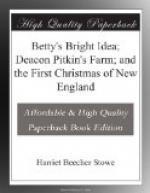Deacon Silas Pitkin was a fair specimen of a class of men not uncommon in New England—men too sensitive for the severe physical conditions of New England life, and therefore both suffering and inflicting suffering. He was a man of the finest moral traits, of incorruptible probity, of scrupulous honor, of an exacting conscientiousness, and of a sincere piety. But he had begun life with nothing; his whole standing in the world had been gained inch by inch by the most unremitting economy and self-denial, and he was a man of little capacity for hope, of whom it was said, in popular phraseology, that he “took things hard.” He was never sanguine of good, always expectant of evil, and seemed to view life like a sentinel forbidden to sleep and constantly under arms.
For such a man to be harassed by a mortgage upon his homestead was a steady wear and drain upon his vitality. There were times when a positive horror of darkness came down upon him—when his wife’s untroubled, patient hopefulness seemed to him like recklessness, when the smallest item of expense was an intolerable burden, and the very daily bread of life was full of bitterness; and when these paroxysms were upon him, one of the heaviest of his burdens was the support of his son in college. It was true that he was proud of his son’s talents and sympathized with his love for learning—he had to the full that sense of the value of education which is the very vital force of the New England mind—and in an hour when things looked brighter to him he had given his consent to the scheme of a college education freely.
James was industrious, frugal, energetic, and had engaged to pay the most of his own expenses by teaching in the long winter vacations. But unfortunately this year the Mapleton Academy, which had been promised to him for the winter term, had been taken away by a little maneuver of local politics and given to another, thus leaving him without resource. This disappointment, coming just at the time when the yearly interest upon the mortgage was due, had brought upon his father one of those paroxysms of helpless gloom and discouragement in which the very world itself seemed clothed in sack-cloth.
From the time that he heard the Academy was gone, Deacon Silas lay awake nights in the blackness of darkness. “We shall all go to the poorhouse together—that’s where it will end,” he said, as he tossed restlessly in the dark.
“Oh no, no, my dear,” said his wife, with those serene eyes that had looked through so many gloomy hours; “we must cast our care on God.”
“It’s easy for women to talk. You don’t have the interest money to pay, you are perfectly reckless of expense. Nothing would do but James must go to college, and now see what it’s bringing us to!”
“Why, father, I thought you yourself were in favor of it.”
“Well, I did wrong then. You persuaded me into it. I’d no business to have listened to you and Jim and got all this load on my shoulders.”




